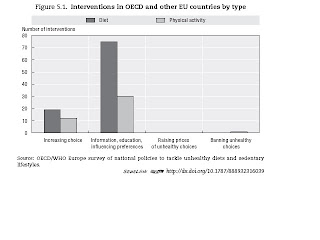En Thaler diu que no és ben bé un oxymoron. En Becker aplana el camí per a Posner.En Posner diu clarament que si.
No és tant important si ho és o no, més aviat el més important és la rellevància per la política sanitària. I aquí és on ens cal reflexionar de veritat. Al llibre Obesity and the Economics of Prevention: FIT NOT FAT hi ha un capítol suggerent sobre el paper dels governs i el mercat. La referència al paternalisme liberal es resumeix aquí:
Preferences may also be influenced in more subtle ways than through the direct provision of information. An important example is what has been described as setting the default option by advocates of “libertarian paternalism” (e.g. Sunstein and Thaler, 2003). The underlying principle is that individual preferences driving an act of choice tend to be influenced by how the default option is configured. An example of the default option is the routine association of a certain side dish to a main course ordered in a restaurant. Customers may be entitled to demand an alternative side dish, but if they did not exercise this faculty they would receive the standard (default) option. Using a healthy option as a default instead of a less healthy one would have a significant effect on the number of customers eventually choosing to consume the healthy option. Actions involving changes in default options may display varying degrees of interference with individual choice and they may be perceived as more or less acceptable by consumers depending on the nature of the choices they aim to influence. For instance, changing the order in which food is arranged in a company cafeteria (Sunstein and Thaler, 2003) in order to steer consumer choices towards healthy options would seem to be a fairly non-intrusive action. However, other actions based on the same basic principle, i.e. changing the default option, may be perceived as much more intrusive. An example is policies making organ donations a default, with individuals being allowed to opt out upon request, have been viewed as most controversial and have been fiercely opposed in many countries, despite evidence which shows these policies may increase organ donations by as much as 25-30% compared to countries where the default is not consenting to donation (Abadie and Gay, 2006).
I el que fan els països OECD en relació a l'obesitat es resumeix en aquesta figura:

Si l'obesitat és considerada com el factor de risc més important, aleshores convé saber què cal fer. El llibre de l'OCDE mostra l'estat de situació però queda molt camí per endavant. Al McKinsey Quarterly ens diuen que els governs han d'actuar.